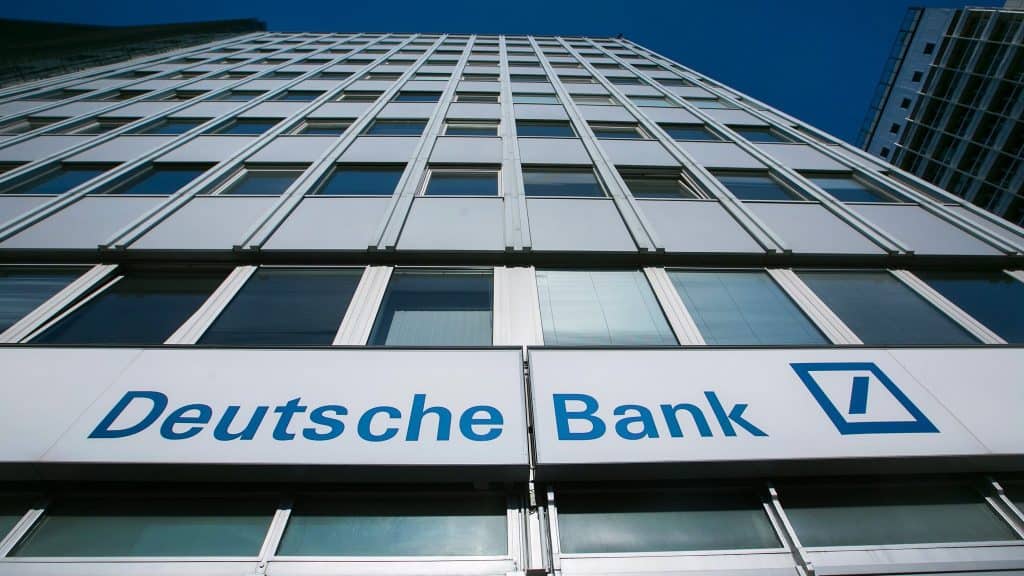Massive restricting costs at Deutsche Bank finally weigh upon the German giant as its net losses for the second-quarter beat analyst expectations by almost 2x. The bank is planning to remove about 18,000 jobs by 2022 and exit from its global equities business.
Deutsche bank faces trouble
Deutsche Bank recently reported its second-quarter financials for 2019, sending shockwaves amongst analyst because of weaker-than-expected results. Analysts from Refinitiv estimated that the German lender would suffer a net loss of 1.7 billion euros for the second-quarter owing to its restructuring program.

However, actual numbers were more disappointing as it suffered a net loss of 3.15 billion euros ($3.51 billion). This year’s results are much worse than the second quarter of 2018 when it posted a net profit of 361 million euros. Since then, the company has witnessed a slew of scandals as well as tumbling stock prices.
Q2 2019 financial reports show that their net revenue decreased to 6.2 billion euros this year, as compared to 6.59 billion euros last year. The common equity tier 1 capital ratio was 14.7% in Q2 2018, which has now dropped to 13.4%. Its substantial strategic transformation charges the amount to a whopping 3.4 billion euros.
The restructuring at the German lender will lead to a major upheaval as it cuts 18,000 jobs. The first among those who lose their jobs are three of its senior executives, Sylvie Matherat, Garth Ritchie and Frank Strauss. They will end their tenure at Deutsche at the end of July.
What’s happening within Deutsche?
According to CEO Christian Sewing, the bank has
“already taken significant steps to implement our strategy to transform” itself. He added, “These are reflected in our results. A substantial part of our restructuring costs is already digested in the second quarter. Excluding transformation charges, the bank would be profitable, and in our more stable businesses revenues were flat or growing.”
It has already served notices to about 900 employees about the termination of their services. Shares of the company have taken a beating in the market and tanked by 30% in the last year.
If the company did not spend billions in its rehashing strategy, it would have made a net income of 231 million euros, which is still lower than 401 million earned in Q2 2018. However, Wall Street isn’t fully convinced with the lender’s policy, and some analysts claim that it is a radical or too ambitious approach.
Trusted & Regulated Stock & CFD Brokers
What we like
- 0% Fees on Stocks
- 5000+ Stocks, ETFs and other Markets
- Accepts Paypal Deposits
Min Deposit
$200
Charge per Trade
Zero Commission on real stocks
64 traders signed up today
Visit Now67% of retail investor accounts lose money when trading CFDs with this provider. You should consider whether you can afford to take the high risk of losing your money.
Available Assets
- Total Number of Stocks & Shares5000+
- US Stocks
- German Stocks
- UK Stocks
- European
- ETF Stocks
- IPO
- Funds
- Bonds
- Options
- Futures
- CFDs
- Crypto
Charge per Trade
- FTSE 100 Zero Commission
- NASDAQ Zero Commission
- DAX Zero Commission
- Facebook Zero Commission
- Alphabet Zero Commission
- Tesla Zero Commission
- Apple Zero Commission
- Microsoft Zero Commission
Deposit Method
- Wire Transfer
- Credit Cards
- Bank Account
- Paypall
- Skrill
- Neteller
What we like
- Sign up today and get $5 free
- Fractals Available
- Paypal Available
Min Deposit
$0
Charge per Trade
$1 to $9 PCM
Visit Now
Investing in financial markets carries risk, you have the potential to lose your total investment.
Available Assets
- Total Number of Shares999
- US Stocks
- German Stocks
- UK Stocks
- European Stocks
- EFTs
- IPOs
- Funds
- Bonds
- Options
- Futures
- CFDs
- Crypto
Charge per Trade
- FTSE 100 $1 - $9 per month
- NASDAQ $1 - $9 per month
- DAX $1 - $9 per month
- Facebook $1 - $9 per month
- Alphabet $1 - $9 per month
- Telsa $1 - $9 per month
- Apple $1 - $9 per month
- Microsoft $1 - $9 per month
Deposit Method
- Wire Transfer
- Credit Cards
- Bank Account


